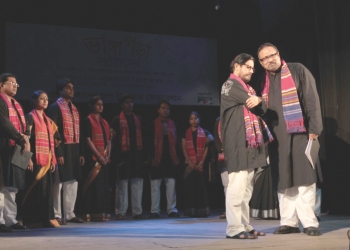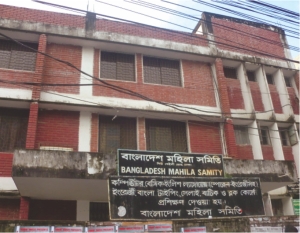| Home - Back Issues - The Team - Contact Us |
 |
| Volume 10 |Issue 35 | September 16, 2011 | |
|
|
One Off Swan Song of the Mahila Samity Aly Zaker Thursday, the 8th of September was a very special day for me. Indeed, for many of us. This is a day that is exceedingly emotional. But in order to put the day in perspective, I am afraid, I will have to fall back on as prosaic a subject as history. Performance of plays on a regular basis by selling tickets started in Dhaka after we achieved our freedom from Pakistan. The date was February 3rd, 1973. A group by the name of Nagorik Nattya Sampradaya started it with their play 'Baki Itihash' by the Late Badal Sarkar, a famous playwright and director from Kolkata. It started at the British Council auditorium and was performed for eight consecutive Sundays. The play featured some of today's famous actors like Ataur Rahman, Sara Amin (Zaker) and Abul Hayat. The other important actor who could have become a stalwart in histrionics opted out of acting to pursue a career in paediatric medicine and has become a very famous doctor called Naila Khan (then known as Naila Zaman).
After the 8th show at the British Council we were informed that we had to move out as GCSC examinations were scheduled to be held in that auditorium. We became very upset, as we had no intention of stopping. We had just started a process of regular staging of plays, which was inspired by the fact that every major city of the world had live theatre going. A search began for our home. Sara Amin told us that we could, perhaps, explore the possibility of shifting to the Mahila Samity Auditorium at the New Bailey Road (now known as Natok Sarani). She had seen a couple of plays there performed by her elder brother, lost in our liberation war, in plays performed by a group called 'The Prometheans'. Since 'Baki Itihash' was directed by me, I had asked her to go and measure out the stage and also examine the acoustics of the auditorium. She took her younger cousin Alif Laila along with her and did the job. We were told the size of the stage and the acoustics would be just right for our plays. So, in the beginning of June, we moved out to the Mahila Samity auditorium and 'Baki Itihash' got its new home. It might not be irrelevant to mention here that 'Baki Itihash' caught the audience of Dhaka by surprise. Our first couple of shows at the British Council did not attract a lot of people. The hall was not even half-full. But soon the word got around about the professionalism with which a play was staged and from the fourth show onward it used to be full-house. If my memory serves me right, in that run, we drew the curtain on 'Baki Itihash' on the 14th show. By, then our next production of 'Bidagdha Ramanikul (The Intellectual Ladies) by Moliere and 'Toilo Sangkat' (a dramatisation of the short story by the same name by Rashid Hyder) was ready for staging as a double bill. And with this started a deluge of activities centring on the Mahila Samity, stage. Our group produced plays like Cross Purpose by Albert Camus and directed by Late Zia Hyder, Bohipeer (also directed by Zia Hyder and written by the famous Sayed Waliullah, who is no more), Bhenpute Behag (a play by The Hungarian Playwright Ferenc Molnar), Ei Nishiddho Pallite, adaptation of Everything in the Garden by the American Playwright Edward Albee and directed by yours truly came on stage one after the other. Soon groups like Theatre, Bohubachan, Dhaka Theatre, and Aranyak also started staging their plays at the Mahila Samity.
This stage, with minimal technical support and the painful ordeal of the audience who endured the heat in the summer months, saw some extraordinary plays performed there. It saw the first epic play by Bertolt Brecht, Good Woman of Setzuan (Swat Manusher Khonje), staged here which went onto complete a hundred performances. Various other groups also presented many path-breaking works. Today, as I sit to write this column, I do not intend to recount the list of prominent productions staged in this hall but I want to put on record how much this hall meant to us. Last Thursday, when I was standing in queue to enter the stage for the last time, with bits of presentation of Nuroldiner Sarajibon, tears would know no bounds. Thankfully the part I was about to act was sombre and full of agony. Therefore, my actual state of mind, as reflected on my face, was not found to be incongruous by the audience. As I look back to the eventful 40 years of my stage activities, I can recount at least a good 35 years that I had spent in the afternoons through rain or sun shine on this stage. They haven't been pleasant physically most of the time. Indeed we all had to suffer quite a bit of discomfort especially in the summer months but the spirit of creativity ran so high that all the rest became insignificant. I remember having performed on this stage, plays like Dewan Gazir Kissa, Shahjahan, The Captain of Kopenick, Achalayatan, Waiting for Godot, and a host of other plays that still adorn the repertoire of Nagorik Natya Sampradya and are intermittently performed from time to time. The very first theatre workshop that was organised by a joint collaboration between the American Centre and Nagorik was done in this hall back in 1974. a very strong team comprising an American Professor of drama and his three students who came from the Indiana State University conducted this three-day workshop. That was indeed the first exposure of the local theatre workers to the world theatre scene. We started off with primitive equipment that are not used anywhere in the world anymore. To name some, I could well mention about the salt water dimmer where the sinking iron transformer to the bottom of the bucket used to increase illumination on the stage. My good friend, the former director of London Academy of Music and Dramatic Art, Roger Croucher was appalled to see this and wanted to take it away to be displayed in his school as an exhibit that would tell his students about how passion could win over impediments. I could not let him do that because that was the only dimmer we had to effectively perform our plays. He had, after seeing the performance of Swat Manusher Khonje, told us and I quote, “It is hard to believe that you all are amateur theatre workers. You are indeed professionals.” Those were the days when all of us used to clean the hall, set up the chairs, adjust the lights, fix the sets and then act on the stage. And I, should think, we must have done a commendable job. Because day after day, people flocked in ever increasing numbers to see our plays. In our endeavour of introducing stage theatre as a regular medium of performing art in Dhaka, we received help from various people. Most of all, the unhindered support by the Late Nilima Ibrahim, Late Ivy Rahman, and Adv. Sahara Khatun of the Mahila Samity, must be mentioned in this regard. But for their support we could not have come to where we are today. The curtain came down on the Mahila Samity stage for the last time on Thursday, the 8th of September and the Mahila Samity has promised us that they will build a few more modern stages at the same venue for us to perform our plays. I hope that this will happen in my lifetime and that I will have the privilege of acting on one of those stages. Adieu and long live Mahila Samity!
Copyright
(R) thedailystar.net 2011 |

